CIArb News
CIArb Egypt Branch Events - July 2020 until March 2021
31 Mar 2021
Webinar on: FIDIC 2017 Red Book: A Civil Law Inclination?”
On 14 July 2020, the CIArb Egypt Branch organised jointly with CRCICA a webinar titled “FIDIC 2017 Red Book: A Civil Law Inclination?” The speakers were Dr Ahmed Waly FCIArb, Managing Partner of Waly – Arbitration and Contract Administration Firm, Adjunct Associate Professor at the Department of Construction Engineering, the American University in Cairo, and Dr Waleed El Nemr FCIArb, Contracts Director of Hill International (Africa) LTD, Adjunct Assistant Professor at the Department of Construction Engineering, the American University in Cairo. The moderator was Dr Salwa Fawzy FCIArb, Commercial Director (Contracts and Procurement) at El Sweedy Industrial Development, and Instructor at the American University in Cairo.
At the onset of the webinar, Dr Fawzy announced the establishment of the Branch’s Mentoring Programme as the first programme initiated by a CIArb branch in the region. The programme provides young CIArb members the opportunity to learn from the experience of more senior CIArb’s community members through several activities like workshops, video conferences, sharing information and networking opportunities. Find out more about the Egypt branch mentoring programme.
The webinar topic was unique, as it made correlations between provisions in the Egyptian Civil Code and clauses in the FIDIC 2017 "Red Book" contract to deduce a possible effect of the former on the latter. Dr Waly and Dr El Nemr highlighted the similarities (as well as some differences) using four concepts as a base for comparison, namely good faith, force majeure/exceptional events, decennial liability and termination for default. The webinar was viewed by 1700 on various social media platforms, attended by 460 participants from 43 countries; namely Bahrain, Belgium, Botswana, Brazil, Cambodia, Canada, Chile, Egypt, France, Greece, India, Indonesia, Iraq, Japan, Jordan, Keya, Kuwait, Lebanon, Libya, Malaysia, Mauritania, Mauritius, Morocco, Nigeria, Palestine, Qatar, Romania, Saudi Arabia, South Africa, Spain, Sri Lanka, Sweden, Tunisia, Turkey, Uganda, Ukraine, United Arab Emirates, United Kingdom, United States of America, Viet Nam, Yemen, and Zimbabwe.
To watch the full webinar click here.
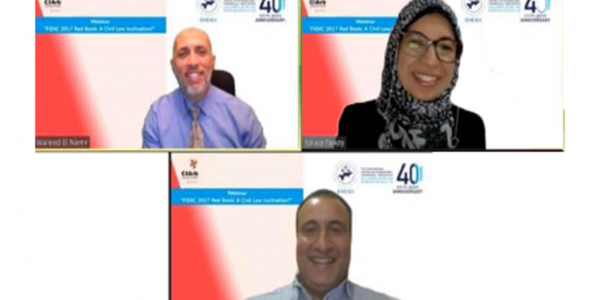
FIDIC 2017 Red Book: A Civil Law Inclination?
Webinar on: Variations after the Contract Completion Date - The "Net" Vs "Gross" Debate
CIArb’s Egypt Branch organised jointly with CRCICA a webinar titled "Variations After the Contract Completion Date - The 'Gross' vs 'Net' Debate" on 15 August 2020. Unlike other events, the webinar was conducted as a mock arbitration hearing where the key players (the speakers) were the claimant: Dr Waleed El Nemr, Contracts Director of Hill International (Africa) LTD, Adjunct Assistant Professor at the Department of Construction Engineering, the American University in Cairo), the respondent: Eng. Amr Askar MCIArb, Host Country Contracts Manager, CDM Smith, and the sole arbitrator (Moderator): Eng. Mahmoud El Saadany, Contracts, Commercial and Project Management Consultant.
The case centered on a debatable topic in the construction industry concerning changes issued after the contract completion date and the extent to which an employer is entitled to apply liquidated damages on a contractor, who receives a late change and clings onto this last-minute change as his rescue from the application of liquidated damages. The contract used for the case was the FIDIC 2017 Red Book. The parties in dispute raised several arguments rooted in contract, law and international practice to argue their respective positions. The webinar was attended by 234 participants from 20 countries; namely Bangladesh, Burundi, Canada, Egypt, Germany, India, Jordan, Kenya, Kuwait, Qatar, Romania, Russian Federation, Saudi Arabia, Spain, Switzerland, Turkey, United Arab Emirates, and the United Kingdom.
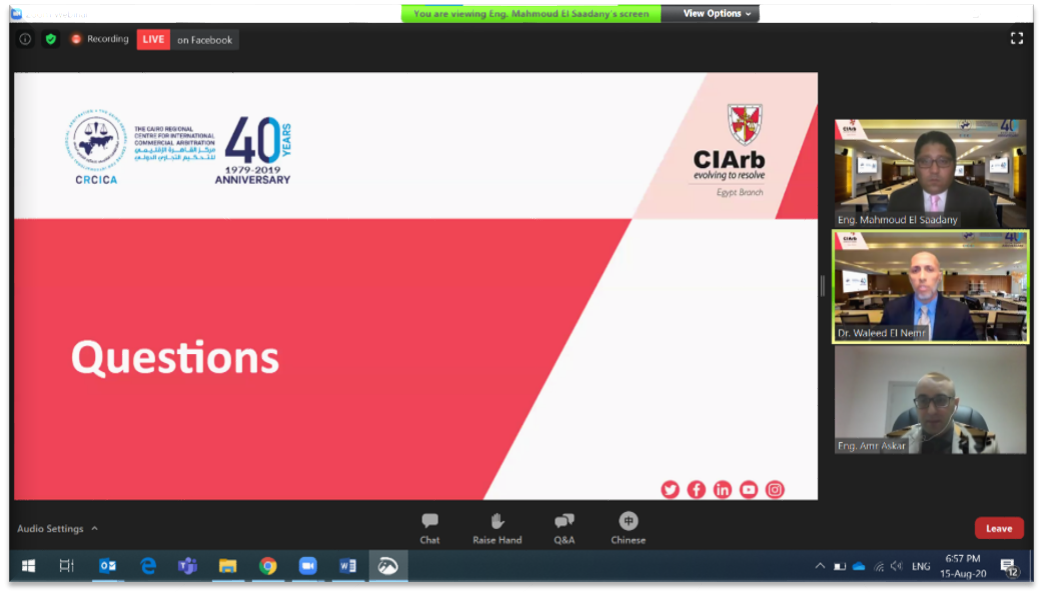
Variations After the Contract Completion Date – The “Net” VS “Gross” Debate
Webinar on: Is Egypt a Friendly or Unfriendly Country to Arbitration?
On 15 September 2020, the Egypt Branch jointly with CRCICA organised a webinar titled: Is Egypt a Friendly or Unfriendly Country to Arbitration? The speaker was Dr Engy Serag MCIArb, Contracts and Claims Director, Orascom Construction and Adjunct Faculty at the AUC. CRCICA’s Director, Dr Ismail Selim MCIArb, moderated the event. The introduction of Dr Selim outlined that Egypt is a friendly country to arbitration since its early adherence to the New York Convention in 1958, hosting CRCICA as one of the first arbitration institutions in the region since 1979. Further, the decisions of the Egyptian judiciary adopts best arbitration practice, while the arbitration awards are enforced under the Egyptian Arbitration Act 1994 (which is adopted with some modifications in various Arab countries). Dr Selim concluded that it is important for Egypt to be a favorite seat for arbitration to attract arbitration cases.
The speech of Dr Serag focused on the need for an arbitration friendly judicial system to settle disputes in light of the recent investment projects in Egypt. She highlighted the challenges in relation to arbitration agreement, arbitration procedures, and enforcement in Egypt. In the Q&A session, several recommendations were highlighted to overcome such challenges. The event was attended by 221 participant from 19 countries; Bangladesh, Burundi, Canada, Egypt, Germany, India, Jordan, Kenya, Kuwait, Qatar, Romania, Russian Federation, Saudi Arabia, Spain, Switzerland, Turkey, United Arab Emirates, United Kingdom, and the United States of America.
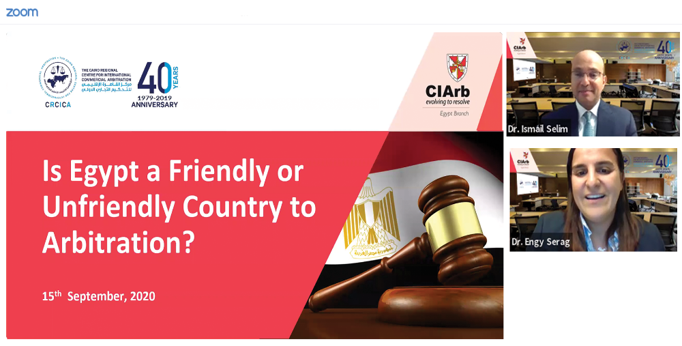
Is Egypt a Friendly or Unfriendly Country to Arbitration?
Webinar on Online Dispute Resolution and the COVID Revolution: A Blessing in Disguise?
Covid-19 has created an unprecedented need for arbitral institutions and organisations to adapt at short notice to new means of working and offer solutions to parties and practitioners that will enable dispute resolution in a time of enforced social distancing. In response to this situation, the CIArb Egypt Branch in cooperation with CRCICA organised a webinar on 14 October2020 titled “Online Dispute Resolution and the COVID Revolution: A Blessing in Disguise?” The guest speaker was Prof Dr Mohamed Abdel Wahab MCIArb & Head of International Arbitration, Construction and Oil & Gas at Zulficar & Partners Law Firm and Member of CRCICA’s Advisory Committee. The moderator was Ms Fatma Ibrahim MCIArb, Mediation Special Advisor to CRCICA.
Prof Dr Abdel Wahab delivered an insightful presentation on the historical background about the stages of ODR adoption in the past until the present. Audience learnt how ODR started from being challenged, then promoted until the world had to acknowledge and believe in it recently, due to the COVID-19, as a framework for online arbitration and mediation. Prof Dr Abdel Wahab shared a forward-looking approach into the future of Artificial Intelligence (AI) and where it may take the world. Reference was made to possible present and future fears that AI increasingly integrate and replace the human element in various practices. The event was exceptionally witnessed by more than 1000 viewers from all over the world. Participants lively shared views and reacted to the polling questions initiated by Prof Dr Abdel Wahab.
Interestingly, the webinar broadcasted a short video of a speech by Prof Dr Abdel Wahab at the UN Forum on Online Dispute Resolution in 2006, long before the current digital leap and the COVID consequences, where Prof Dr Abdel Wahab emphasized that “ODR is a reality and it does exist, and not a dream anymore”!
At the end of the event, Dr Ismail Selim, Director of CRCICA, announced that CRCICA will co-organise with Arbitrate.Com the virtual training course on: ‘Online Arbitration- Best Practices and Avoiding Pitfalls’, in November 2020. The training will be a comprehensive overview of online arbitration and its best practices presented by top leader of ODR. To know more about the training click here
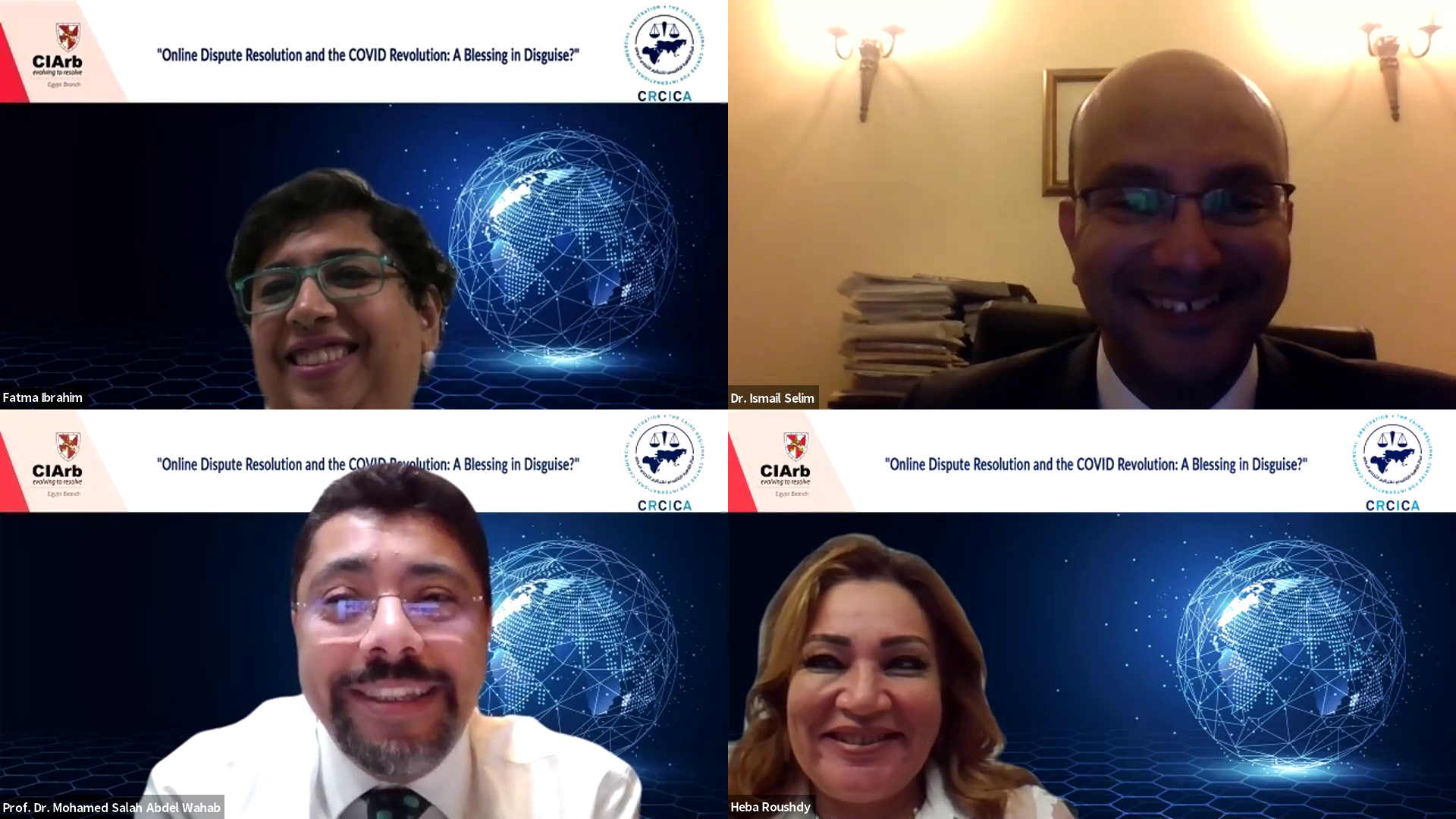
Online Dispute Resolution and the COVID Revolution: A Blessing in Disguise?
Webinar on Private-Public Arbitration, with Special Reference to PPP Contracts in the MENA Region
On 13 December 2020, the CIArb Egypt Branch and CRCICA jointly organized the webinar on: Private-Public Arbitration, with Special Reference to PPP Contracts in the MENA Region. The speaker was Judge Dr Mohamed A M Ismail FCIArb, Vice-President of the "Conseil D'Etat" and Judge at the Supreme Administrative Court (Contracts Circuit), and Member of the "Comite Francais De L'Arbitrage". The Moderator was Ambassador Mohamed Moustafa KAMAL MCIArb, Former Assistant Minister of Foreign Affairs, Attorney- at – law, and Member of the Committee of CIArb Egypt Branch.
The presentations focused on vital questions such as: Are the current Arab legislation following the French Civil Code conceptualization of the restricted right of public actors’ recourse to arbitration (Article 2060)? Are their exception to the rule in France and Arab countries? To what extent is the influence of the legal globalization phenomenon to Arab legislation and arbitration practice? Can arbitrators exercise public authority by reviewing government acts as to their legality (principle of legality)? and 'What is the new rising science of “lex mercatoria publica”'?
Following the webinar, a prize draw was won by one of the webinar’s participants. The winner won a book titled “Public Private Partnership Contracts - The Middle East and North Africa" authored and dedicated by Coun. Dr Mohamed A M Ismail FCIArb.
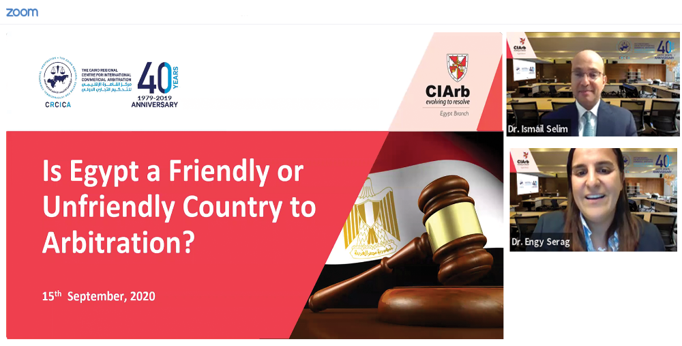
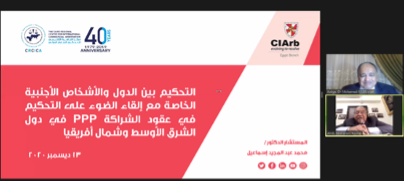
Private-Public Arbitration, with Special Reference to PPP Contracts in the MENA Region
Webinar on DABs v DRBs - Answers to Frequently Asked Questions
On 19 December 2020, the CIArb Egypt Branch organised jointly with the Dispute Resolution Board Foundation (DRBF) a webinar on DABs v DRBs - Answers to Frequently Asked Questions. The event aimed at providing answers to questions related to Dispute Adjudication Boards "DAB", as a well-known tool to avoid and resolve construction disputes throughout the MENA region, from the prevalent use of FIDIC construction contracts, against Dispute Review Boards "DRB" as a widely used tool in North America and elsewhere in the world.
The speakers were Dr Ahmed Waly FCIArb, Managing Partner, WALY – Arbitration and Contract Administration Firm, Adjunct Associate Professor at the Department of Construction Engineering, the American University in Cairo (CIArb Egypt representative addressing DABs) and Ms Elizabeth Tippin FCIArb, President of the DRBF Region 1 Board of Directors and DRBF Trainer, Adjudicator, Mediator, and Dispute Resolution Board Member (DRBF representative addressing DRBs). Expert speakers compared the two successful methods for dispute avoidance and resolution. The event was moderated by Ms Ann Russo, Executive Director of the DRBF, Co-editor of the ‘Dispute Board Manual: A Guide to Best Practices and Procedures’, and Editor of the DRBF’s quarterly journal, The Forum.
Participants were invited to submit questions in advance and were answered during the event. Some questions inquired about the prospective CRCICA’s DB Rules and if it would be limited to DAB, as in FIDIC, or is it applicable to other forms of DBs. The webinar was attended by over 200 viewers representing different business sectors from Belgium, Canada, Denmark, Dominican Republic, Egypt, France, Ghana, Greece, India, Jordan, Kenya, Kuwait, Lebanon, Lebanon, Maldives, Nigeria, Oman, Palestine, Qatar, Romania, Saudi Arabia, Singapore, Sri Lanka, Sudan, Sudan, Switzerland, Tanzania, Tunisia, Turkey, United Arab Emirates, United Kingdom, and Yemen.
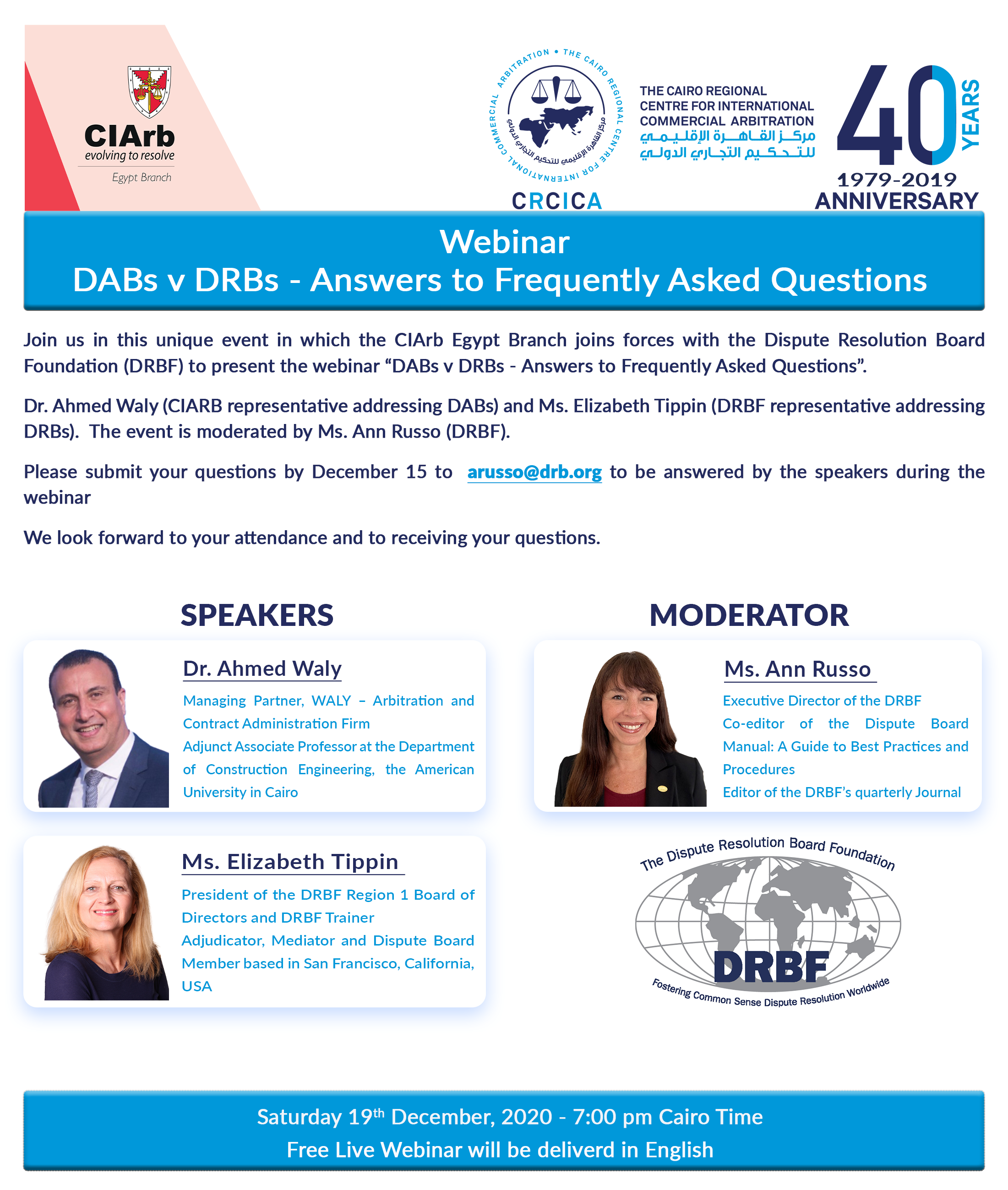
DABs v DRBs – Answers to Frequently Asked Questions
Webinar on: Withdrawal of a Court of Cassation Decision, an Exception on Res judicata
On 13 January 2021, the CIArb Egypt Branch jointly with CRCICA organised the webinar on: Withdrawal of a Court of Cassation Decision, an Exception on Res Judicata. Prof Dr Mohamed Hossam Loutfi, Professor of Civil Law, Faculty of Law, Bani-Suef University, Chair of UNESCO of Copyright and Neighboring Rights, Attorney-at-law, Court of Cassation was the speaker. Ambassador Mohamed Moustafa KAMAL, Former Assistant Minister of Foreign Affairs, Attorney- at – law, MCIArb & Member the Committee of the CIArb Egypt Branch was the moderator. The webinar focused on Res Judicata as an important part of any reliable legal system, however, in certain cases we need to put it aside as to achieve justice.
Prof Dr Lotfi focused on the withdrawal of the awards of the Egyptian Court of Cassation as a common practice of the criminal circuits of the Court of Cassation, though it is completely excluded from the civil circuits. It is a contradiction that requires to be reviewed, outlined Prof Dr Lotfi, as it is not reasonable that the “souls and freedom of people” would be more privileged and protected than their “money”. The role of the Court of Cassation is to avoid double standards in this regard. Withdrawal of the cassation awards is through submitting a legal request or a petition whenever the court makes a mistake that should not be incurred by the appellant. Prof Dr Lotfi shed light on the current attitude of the Egyptian Court of Cassation compared with the attitude of the Higher Courts towards the comparative law in support of fairness and justice. Participants from different business sectors attended the webinar from: Afghanistan, Albania, Austria, Bahrain, Canada, Ecuador, Egypt, France, Ghana, Iraq, Ireland, Japan, Jordan, Kenya, Kuwait, Lebanon, Libya, Morocco, New Zealand, Nigeria, Oman, Palestine, Qatar, Russian Federation, Saudi Arabia, Spain, Sudan, Tunisia, Turkey, United Arab Emirates, United Kingdom, United States of America, Yemen, and Zimbabwe.
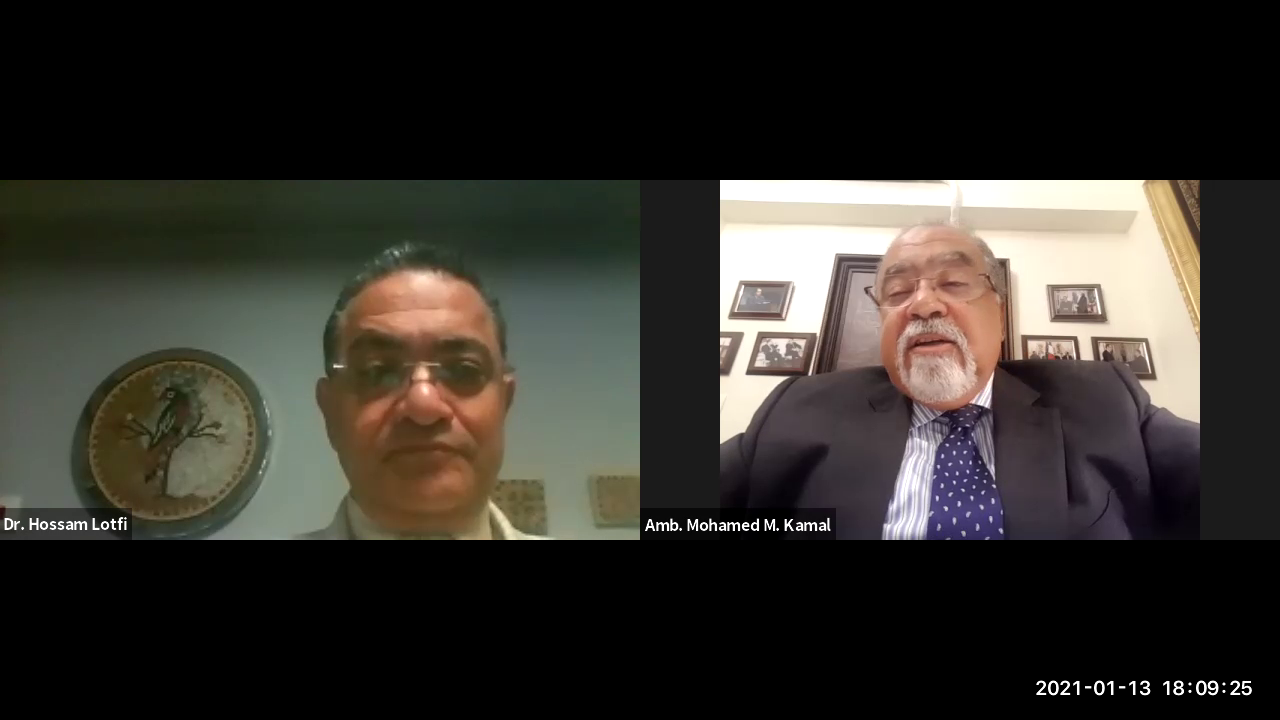
Withdrawal of a Court of Cassation decision, an exception on Res Judicata
Webinar on Investment Treaty Reform in Times of COVID-19: A Policy Perspective
On 3 February 2021, the CIArb Egypt Branch jointly with CRCICA organised a webinar titled : Investment treaty reform in times of COVID-19: a policy perspective. The speaker was Mr Hamed El Kady, UNCTAD International Investment Policy Officer, Division on Investment Enterprise, United Nations Conference on Trade and Development (UNCTAD). The event was moderated by Prof Dr Mohamed Abdel Raouf MCIArb, Chairman of the CIArb Egypt Branch.
The webinar shed light on a number of timely issues relating to international investment agreements (IIAs): First, it addressed the importance of reforming existing IIAs now in times of COVID-19. There is a growing need to safeguard policy space without attendant risk of facing investment claims that can arise from the friction between IIAs and the emergency State policy measures required to combat the pandemic. The vast majority of existing IIAs were enacted at a time when the present global challenges (public health, environment, climate change and sustainable development) were not areas of pressing concerns. Indeed, there is still a stock of 2,500 old generation treaties and 99% of all known ISDS cases are based on these old treaties.
Second, the session discussed the most urgent provisions that are in need of reform and how. The treaty provisions in urgent need of reform are those that are most frequently invoked in ISDS claims. UNCTAD’s IIA Reform Accelerator highlights some of these provisions (1. Definition of investment and investor; 2. Fair and Equitable Treatment; 3. Expropriation; 4. Most Favored Nation and National Treatment; 5. Public Policy Exceptions; and 6. The ISDS Mechanism) and provided specific language on how they should be formulated to ensure a balance between maintain investment protection and ensuring the right of host States to regulate in the public interest.
Third, the webinar discussed how can UNCTAD step up its assistance to developing countries in reforming their investment treaty regimes through providing tailor-made technical assistance products, including the elaboration of model BITs or conducting comprehensive IIA reviews. This is in addition to the development of policy documents intended to guide policymakers and IIA negotiators when reforming their existing treaties. These include UNCTAD’s Investment Policy Framework for Sustainable Development, UNCTAD’s Reform Package for International Investment Regime, and the new UNCTAD IIA Reform Accelerator.
Finally, the webinar included an interactive discussion with participants, and allowed for polling surveys on a number of critical issues, including on specific recommendations for countries wishing to maintain a strong legal framework for investment while ensuring their right to regulate in the public interest. A number of real life examples were shared, including the formation of inter-ministerial task forces in a number of countries tasked with reforming IIAs while ensuring coherence with national development strategies and national laws and regulations on investment. 240 participants attended the webinar from : Angola, Bahamas, Bahrain, Bosnia and Herzegovina, Botswana, Brazil, Cameroon, Canada, Czech, Egypt, Ethiopia, France, Georgia, Germany, Ghana, Greece, Hong Kong SAR, India, Indonesia, Japan, Jordan, Kenya, Kuwait, Latvia, Lebanon, Libya, Morocco, Netherlands, Niger, Nigeria, Palestine, Philippines, Qatar, Romania, Saudi Arabia, Sierra Leone, Singapore, South Africa, Spain Switzerland, Tanzania, Tunisia, Turkey, Uganda, United Arab Emirates, United Kingdom, USA , and Zambia.
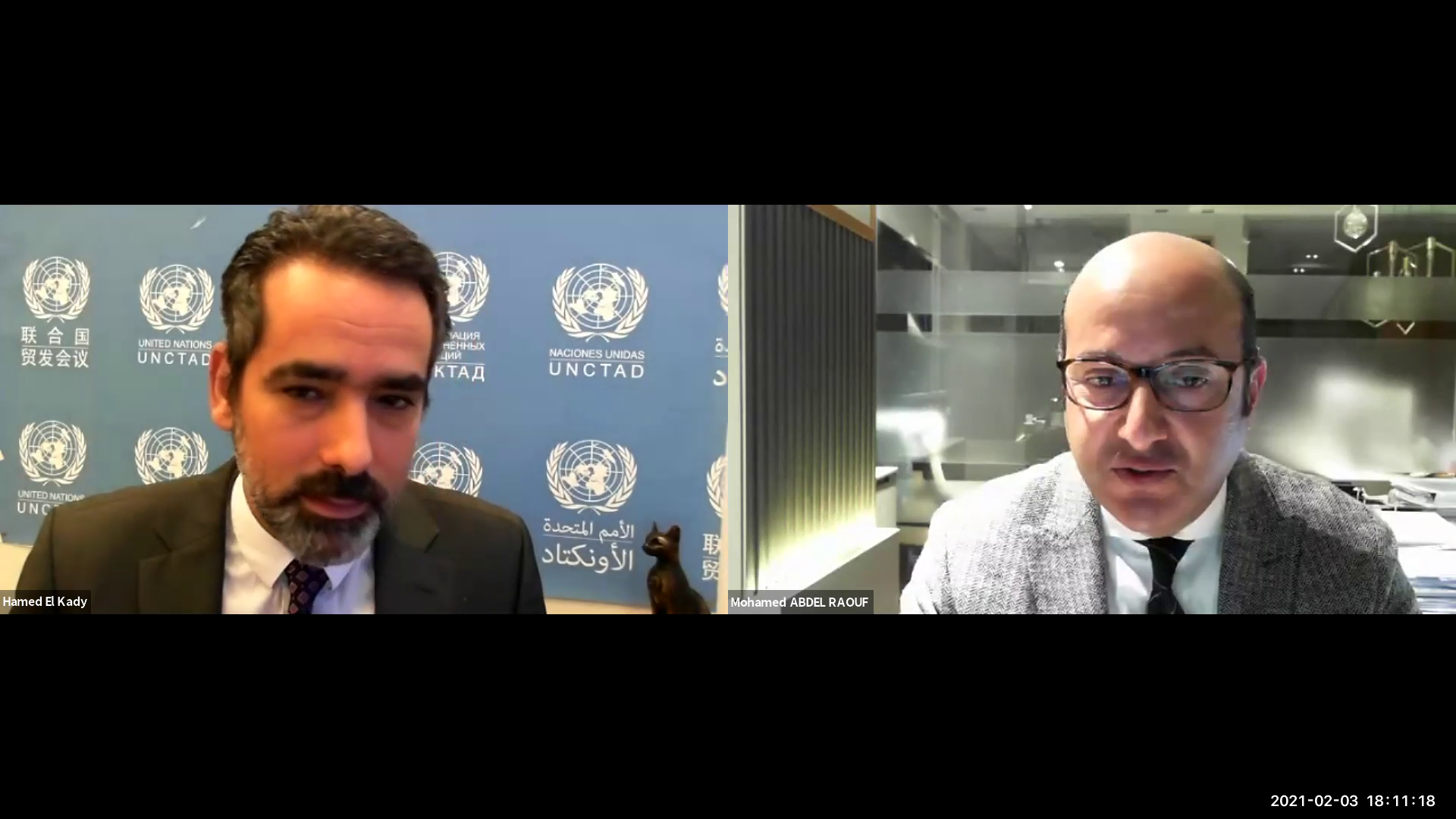
Investment Treaty Reform in Times of COVID-19: A Policy Perspective
Webinar on the New World of Arbitration - Lessons for Counsel and Arbitrators
On 8 March 2021, the CIArb Egypt Branch jointly with CRCICA organised a webinar titled ‘The New World of Arbitration - Lessons for Counsel and Arbitrators from the Past Year’. The speaker was Ms Anne Hoffmann FCIArb, Independent Arbitrator, and the moderator was Dr Ismail Selim MCIArb, Director of CRCICA and Vice-Chairman of the CIArb Egypt Branch.
The webinar dealt with the developments in the field of arbitration that have taken place over the past year, from virtual hearings to paperless submissions. Ms. Hoffmann addressed the way in which counsel and arbitrators have changed their way of working, the advantages this may bring, from efficiency to being more environmentally friendly, but also potential pitfalls that practitioners should be aware of. An interesting Q&A permitted to address questions from the increase in the cost-effectiveness of arbitrations to matters of cybersecurity. A poll amongst the participants showed that a large majority believes that the changes we have witnessed are beneficial to its users and that they will stay beyond the pandemic. The webinar was viewed by 145 participants from 31 countries: Bahrain, Botswana, Canada, Côte d'Ivoire, Egypt, France, Hong Kong SAR, India, Italy, Jordan, Kenya, Kuwait, Lebanon, Morocco, Nigeria, Palestine, State of Portugal, Qatar, Romania, Saudi Arabia, Spain, Sudan, Switzerland, Tanzania, Tunisia, Turkey, United Arab Emirates, United Kingdom, United States of America, Zambia, and Zimbabwe.
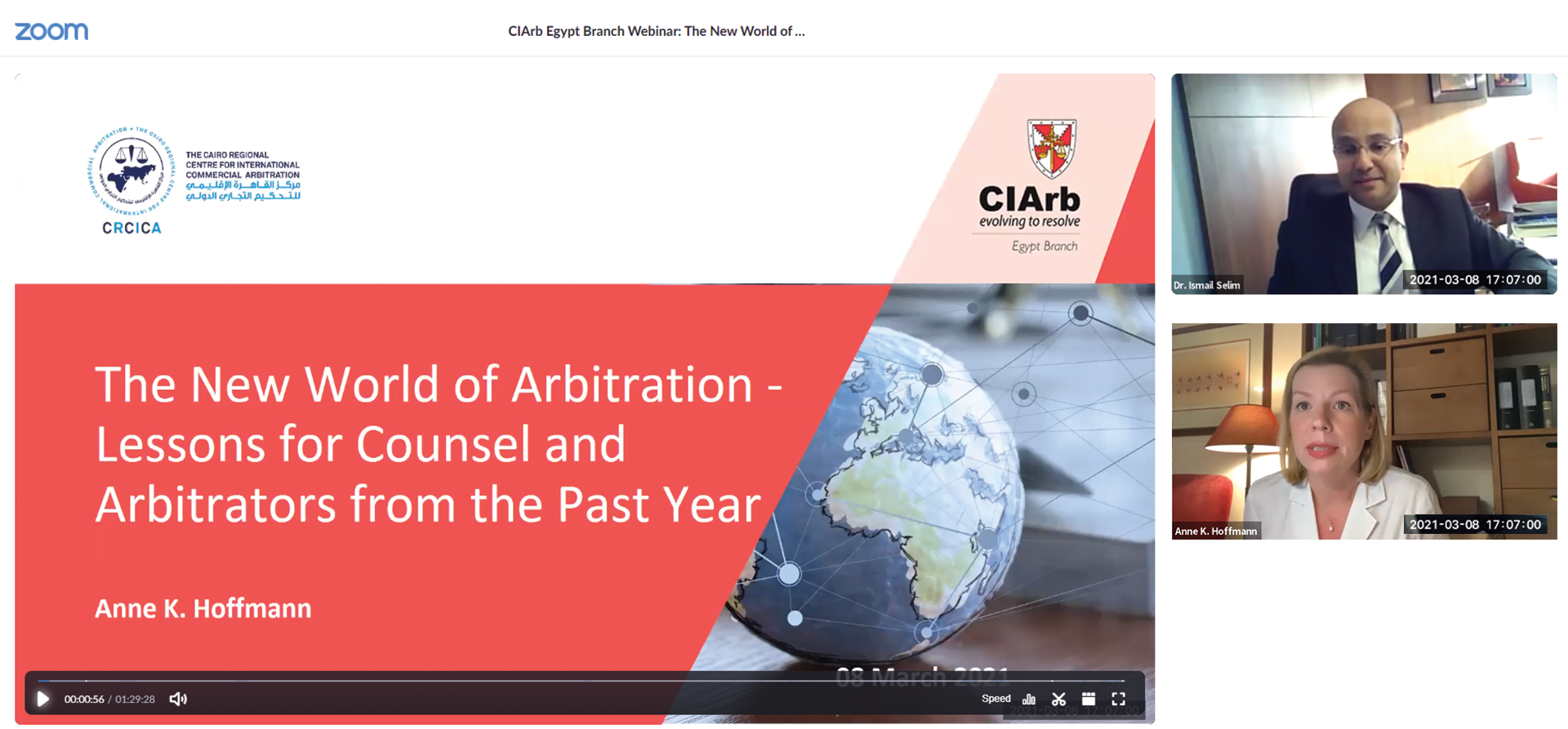
The New World of Arbitration – Lessons for Counsels and Arbitrators for the Past Year
Two Training Courses on: Comparative Commercial Arbitration - Theory and Practice
On 5-12 December 2020 and 14-18 March 2021, CRCICA as a Recognized Course Provider (RCP) and the seat of the Egypt Branch jointly with the Branch organised two rounds of the Training Course on : Comparative Commercial Arbitration: Theory and Practice (CCATP) both hosted by CRCICA.
The programme covered the most important issues in international arbitration and ADR: overview of ADR mechanisms, arbitration agreements, arbitral tribunals, arbitral proceedings, arbitral awards and post-awards remedies.
The courses were tutored by Prof Dr Mohamed S. Abdel Wahab MCIArb; Chair of Private International Law and Professor of International Arbitration at Cairo University; Funding Partner & Head of the International Arbitration, Construction, Oil & Gas and Projects Groups, Zulficar & Partners Law Firm; and Vice-President of the ICC International Court of Arbitration, Prof Dr Mohamed Abdel Raouf; Attorney at Law, Partner and Head of the International Arbitration Group at Abdel Raouf Law Firm, and Associate Professor at Université Paris 1 Panthéon-Sorbonne, Dr Ismail Selim MCIArb; Director of the CRCICA, Vice-Chairman of the CIArb Egypt Branch, Lecturer at Pantheon Sorbonne University Paris I (Cairo Branch), and Dr Dalia Hussein MCIArb; Deputy Director of the CRCICA, Lecturer of Commercial and Maritime Law at the Faculty of Law Zagazig University and adjunct professor of law at the American University in Cairo.
Reference texts comprised an unprecedented collection of documents including the most recent institutional rules, model and national laws, guidelines and code of ethics. It also included comparative state court decisions from the most important jurisdictions, and a large number of analytical articles by renowned scholars and expert commentaries. The written assessment was held on the last day of the program. The examination included various questions and a complex mock case carefully prepared based on CRCICA accumulative experience over 40 years in the administration of arbitration cases. Participants were mostly lawyers, civil and construction engineers and academics.
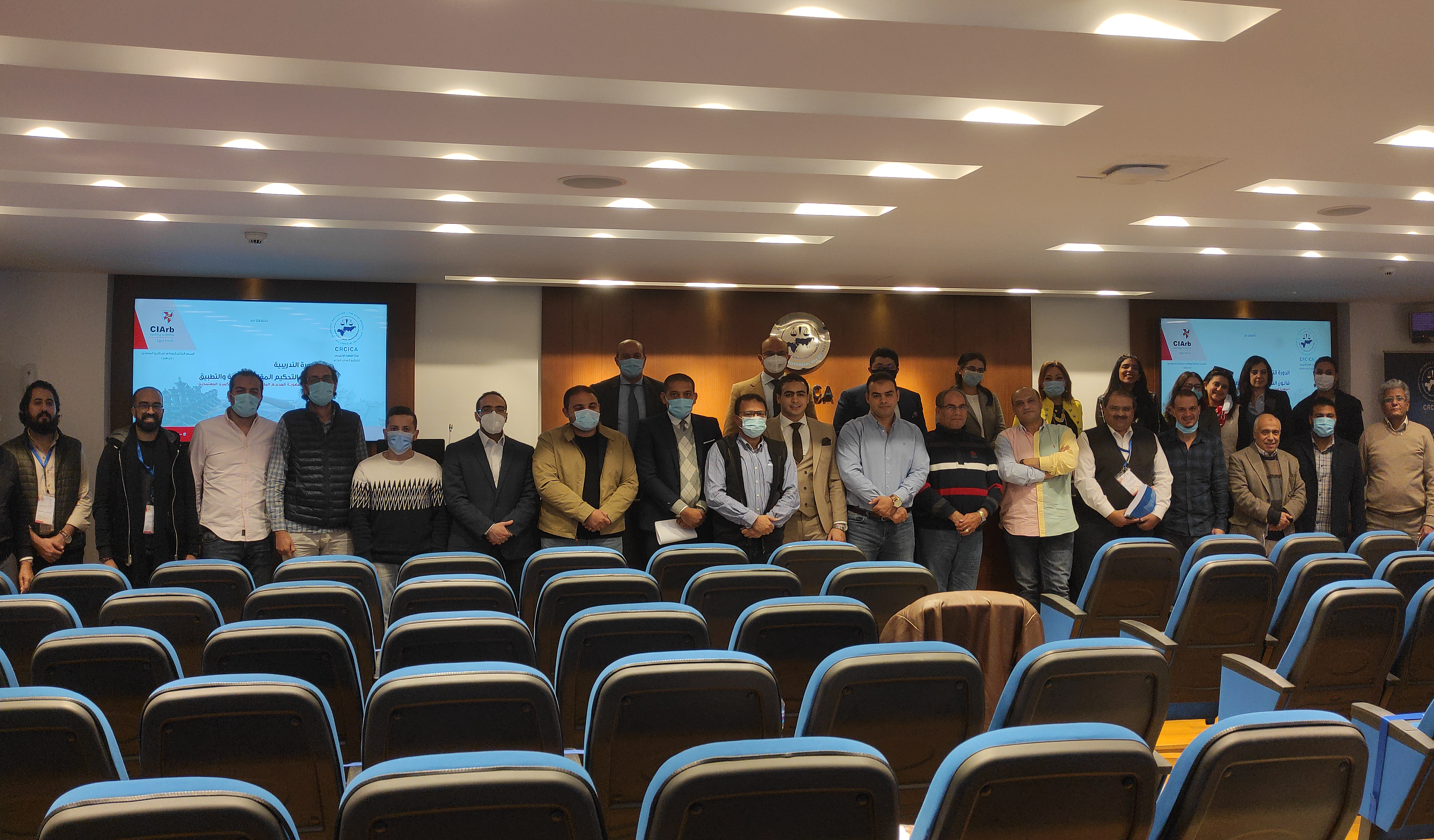
Two Training Courses on Comparative Commercial Arbitration: Theory and Practice (CCATP)
The December 2020 and March 2021 CCATP courses were organised by CRCICA (an accredited RCP and the seat of the Branch) and the Egypt Branch.
CCATP courses qualify successful candidates to apply for CIArb Membership.
Time-Barring Provision in Construction contracts
On 30 March 2021, the CIArb Egypt Branch jointly with CRCICA organized the webinar on Time-barring Provisions in Construction Contracts. The speaker was Prof. Dr. Sherif Elhaggan; Partner, Director, Dr. Sherif Elhaggan & Partners, FCIArb, CEDR / IFC Accredited Mediator, London, Dispute Review Board Foundation Country Representative, and Professor (Construction Law) AASTMT, the moderator was Dr. Ismail Selim; Director of CRCICA and Vice-Chairman of the CIArb Egypt Branch.
The webinar delved into the debate that arised from the application of time bar clauses in light of the recent introduction of time-barring provisions into construction contracts, causing tremendous controversies and subject to different interpretations even within the same legal system and arbitration.
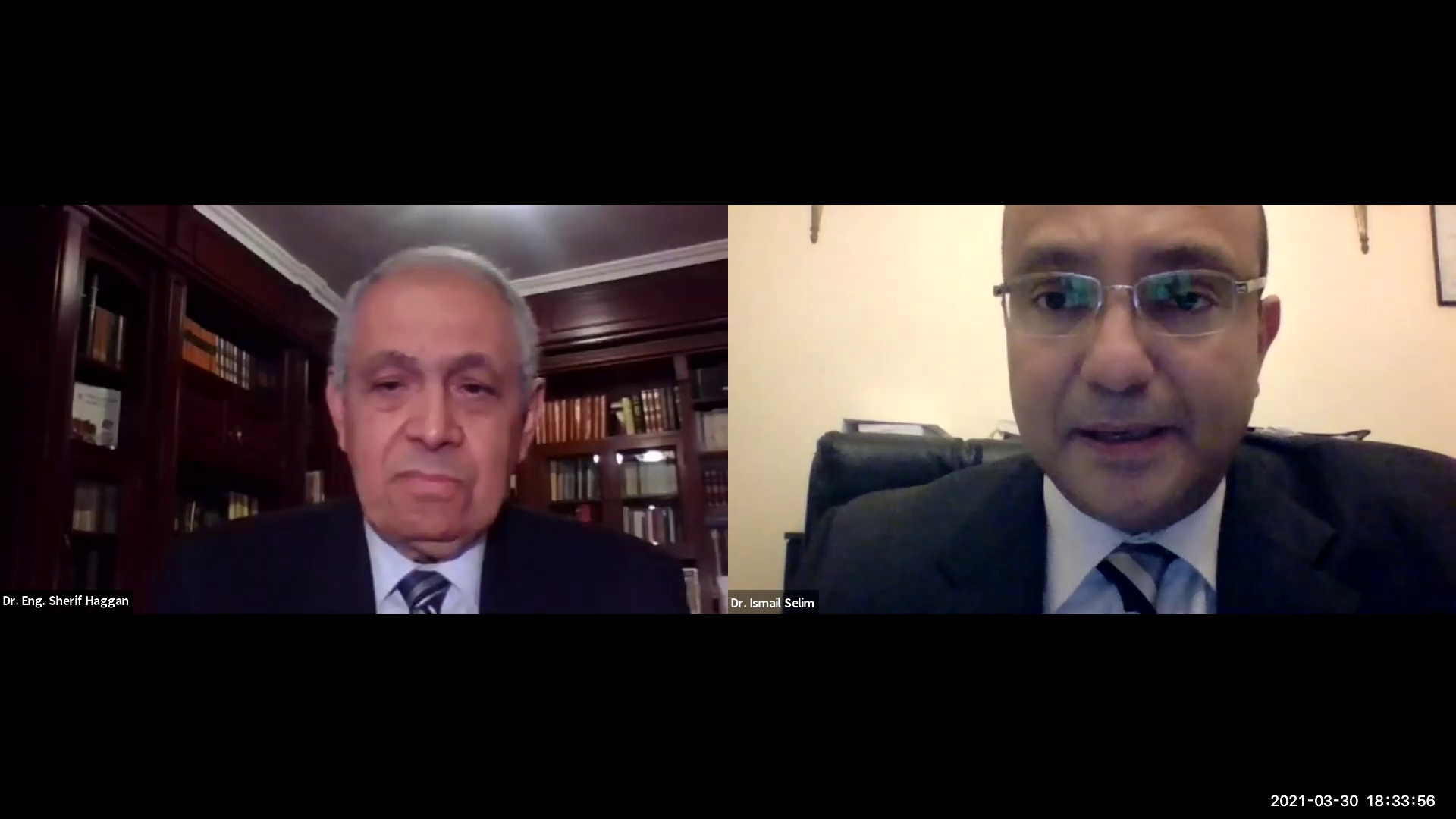
520 participants attended the webinar from: Algeria, Antarctica, Austria, Botswana Burkina Faso, Canada, Cyprus, Dominican Republic, Egypt, France, Germany India, Italy, Jordan, Kenya, Kuwait, Lebanon, Morocco, Nepal, Netherlands, Nigeria, Oman, Pakistan, Palestine, Philippines, Qatar, Romania, Saudi Arabia, South Africa, Spain, Sudan, Tanzania, Tunisia, Turkey, United Arab Emirates, United Kingdom, United States, Yemen, and Zambia.
12 Apr 2024
Significant progress on Advisory Centre for International Investment Law at UNCITRALIn 2017, UNCITRAL Working Group III (WGIII) was launched and was tasked with working on procedural reform of the investor state dispute settlement (ISDS) system. From 1-5 April 2024, Ciarb participated in the 48th session of WGIII in its capacity as an observer delegate.
12 Apr 2024
A promising future: Strengthening mediation through diversityWe speak to mediator and Imam Ibrahim Hussain MCIArb about mediation’s bright future, and why diversity strengthens mediation.
12 Apr 2024
RIDW24: Construction Arbitration Trends and Key TakeawaysCristen Bauer, Ciarb's Head of Policy, highlights a few key takeaways from the discussions at Riyadh International Disputes Week 24 (RIDW24)